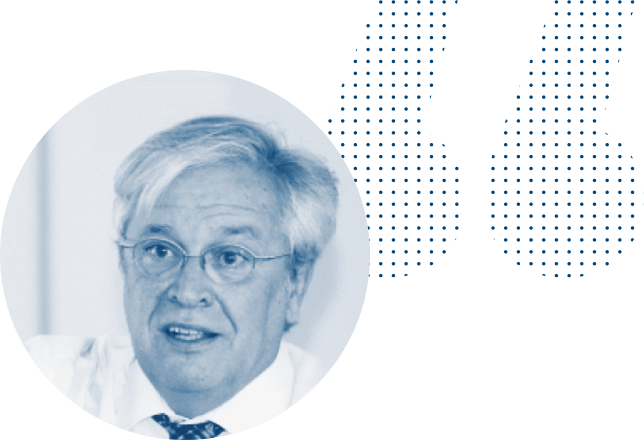Testimonials
Presidency

Pasqual Maragall
Mayor of Barcelona (1982-1997) and president of the General Council of the PEMB (1988-1997)
My grandfather was born in the Ribera neighbourhood and in a generation he went over the wall, to Carrer de Trafalgar, the Eixample and Sant Gervasi. If our grandparents could make that giant leap, I am convinced that our generation can jump to a metropolitan scale.
Reality cannot be denied and the metropolitan region has expanded beyond the strict limits of the 27 metropolitan municipalities towards the surrounding counties. This will force a new model of local government to again take Barcelona's stubborn reality into account.

Joan Clos
Mayor of Barcelona and president of the General Council of the PEMB (1997-2006)
The Barcelona Strategic Plan was a tool using civic and social participation to develop ideas and approaches for the years after the Olympic Games. We wanted to exert effort to think together so we could avoid what had happened to other Olympic cities, where a dearth of initiatives and proposals after the Games ended in a collective depression. Many Olympic cities had been hit by great economic depression and chronic deficits that Barcelona wanted to avoid. Hence, the Strategic Plan began three years before the Olympic Games were held, looking ahead to the next period of development in Barcelona. The port, the fairgrounds, the unions, the universities, the Zona Franca Consortium, the neighbourhood associations and everyone else were asked to actively participate to get all major institutions to think about the future. Now, 30 years later, many of the concepts of the Strategic Plan have become part of our shared culture. Yet at that time, they represented true innovation in the culture of institutional relations and even in the development of a new language.
Fresh economic, social and territorial prospection would undoubtedly be very useful given the new realities, on all levels, in the first half of the 21st century.

Jordi Hereu
Mayor of Barcelona and president of the General Council of the PEMB (2006-2011)
The Barcelona Metropolitan Strategic Plan (PEMB) has contributed to different factors significant to our development: we have thought together about the world we live in, we have “thought together” as a metropolitan city and, thinking together, we have come up with the idea and practice of the city as a collective project, where we are all have roles to play. All this has happened in 30 years, during which the world has changed faster than ever, where “we” started as the city of Barcelona and are now the greater metropolitan area of Barcelona, and where the need to conceive and build the city as a governance project is becoming increasingly clear in Barcelona and elsewhere.
If it was necessary to create a roadmap 30 years ago, it is even more so in Barcelona and the world today. If 30 years ago there was a feeling that dialogue and consensus among everyone who built a city was necessary to move forward, it is imperative today. In the next few years we will continue to experience dizzying change. Only by thinking and transforming together can Barcelona become a leading actor and not a passive scenario of change. Our people's welfare and freedom are at stake. In a world undergoing urban development largely without a project for the city, Barcelona must continue to be a good benchmark for a project built together.

Xavier Trias
Mayor of Barcelona, president of the AMB and president of the General Council of the PEMB (2011-2015)
The PEMB has been the fundamental tool for the metropolitan development of Barcelona. When the Barcelona Metropolitan Area (AMB) had not yet been constituted, it guided actions with a supra-municipal vision that tended to a local economic and social reality beyond the administrative bounds of the different city councils. Later, the PEMB became the backbone of the policies promoted by the AMB once it had become a constituted administration. The PEMB encouraged us to move forward in a direction and on a path from which there is no way back today: the path of partnership among all the political, economic and social actors of the AMB to define strategies and guide joint actions.
Now more than ever, the AMB needs a tool so it can set goals in the short, medium and long term, while always backed by the agreement (the broader the better) of all the municipalities involved. Metropolitan areas are being called to take on a greater role in defining public policies on issues that have a direct impact on people. Housing is a good example. A metropolitan perspective on policy will gradually come to the fore. Therefore, a new strategic plan under the umbrella of consensus is in order to help us to define our future challenges and objectives.

Ada Colau
Mayor of Barcelona, president of the AMB and president of the General Council of the PEMB (since 2015)
Cities and the metropolitan areas they structure have a great responsibility to respond effectively to the new global challenges that states have been unable to resolve by themselves. The growth of inequalities, climate change, massive population displacements as a result of war, hunger and natural disasters, as well as the crisis of legitimacy affecting democratic institutions, all require new leadership. This is why the place where the future of cities is being considered and planned is also where the future of the planet is being considered and planned.
Since 1988, Barcelona has been at the forefront of this line of thought, the first milestone of which was the Barcelona Economic and Social Strategic Plan 2000.
Thirty years later, this line of thought continued with the PEMB and a clear metropolitan calling. At this Association, which includes the promoting public administrations and other members that form part of their governing bodies, we want to continue considering and planning by adapting to global changes and opening ourselves increasingly to new metropolitan actors. We must remain aware that discussions about the future of metropolitan Barcelona must also include municipalities that make up the “real city” that extends beyond the limits of the Barcelona Metropolitan Area.
